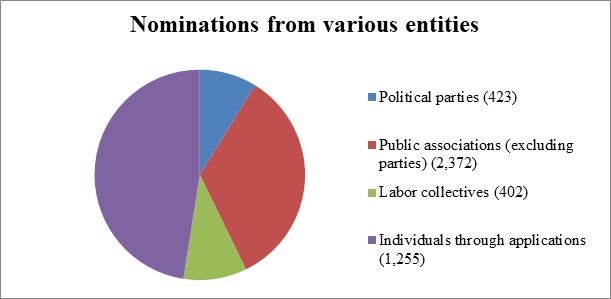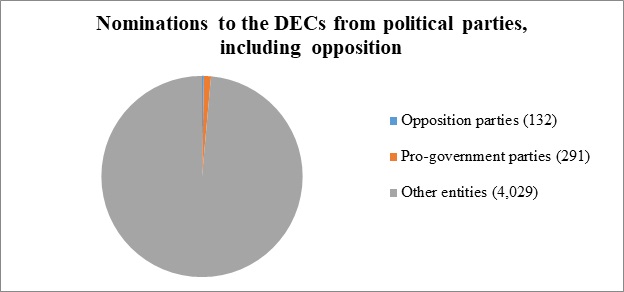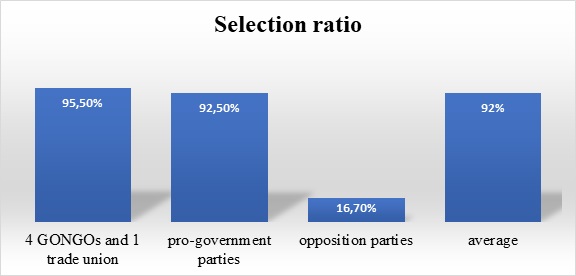Monitoring report on the formation of district election commissions
EXECUTIVE SUMMARY
- The district election commissions for the elections of members of Regional Councils and the Minsk City Council of Deputies (hereinafter — DECs) are an important actor of the election process. The DECs’ powers include, among other things, organization of the elections, management of the precinct election commissions, registration of nomination groups, campaigning, registration of candidates and their proxies, control over the preparation of voter lists, consideration of complaints against decisions and actions of precinct election commissions.
- As before, one of the essential issues of concern enshrined in the Electoral Code is a legal requirement for the presence of registered local structural units of the subjects of the electoral process, which is still a major obstacle in nominating representatives of political parties and public organizations to the DECs.
- There were no obstacles to the submission of applications for the nomination of representatives to the DECs. Information about the time and place of meetings of the authorities in charge of forming the DECs was published in due time on the websites of the executive committees and in local government-run media.
- All members of the campaign “Human Rights Defenders for Free Elections” had the opportunity to attend the meetings of the authorities in charge of the formation of the DECs, which is a positive development as compared to the local elections of 2014, when 43% of the campaign's representatives were denied the right to attend such meetings.
- The majority of the campaign's representatives, who were present during the formation of the DECs, had no opportunity to examine the documents submitted to nominate representatives to the DECs. Executive officials referred to the absence of such a right as the grounds for refusing access to nomination documents.
- During the formation of DEC No. 47 at a joint meeting of the Presidium of the Brest regional executive committee and the Brest Regional Council, an observer found that instead of 11 protocols and nomination applications, only 5 protocols and 1 application were available, which is a violation of the Central Election Commission’s Regulation No. 36 governing the procedures of nomination of representatives to election commissions.
- The formation of the DECs involved the discussion of personal and professional qualities of nominated candidates, and in cases when the number of nominees exceeded the number of nominated the number of seats on the DECs, a rating-based vote was held. The formation of the DECs by the Viciebsk, Brest and Mahilioŭ regional executive committees involved no discussion of nominated candidates.
- Political parties nominated to the DECs 423 applicants, representing 9.5% of the total number of nominated candidates; public associations nominated 2,372 people, or 53.3% of the total amount of nominees; individuals nominated 1,255 persons, or 28.2 % of the total number of nominated candidates. Opposition parties nominated a total of 132 persons, or 31.2% of the total amount nominated by political parties or 3% of the total number of nominees.
- The level of representation of opposition parties in the DECs remains extremely low. In particular, of 132 persons nominated by the opposition parties, only 22 people were included in the DECs, or 16.7% of the number of nominated candidates (during the local elections in 2014 — 5.25%). For example: of 291 persons nominated by pro-government political parties, 271 people became DEC members, or 92.5% of the total number of nominees, and of 1,960 persons nominated by the five major pro-government public associations (BRSM, Belaya Rus, Women's Union, the Union of Veterans and Trade Union Federation), 1,871 were selected as commissioners, or 95.5% of their nominees. The total number of representatives of opposition parties on the DECs is 0.53%. During the local elections of 2014, the figure was 0.25%.
- Executive officials still demonstrated an obviously discriminatory approach to the opposition parties during the formation of the DECs, which was observed in earlier elections. The main criterion used in the formation of the DECs is previous experience of work in election commissions. It should be noted that the introduction of a requirement to consider the candidates’ professional and personal qualities did not contribute to greater political pluralism in the DECs.
- The process of formation of the DECs took place in an atmosphere of greater transparency as compared to the previous local elections of 2014, but in general the new practices and the results of the formation of the DECs did not differ from previous election campaigns.





